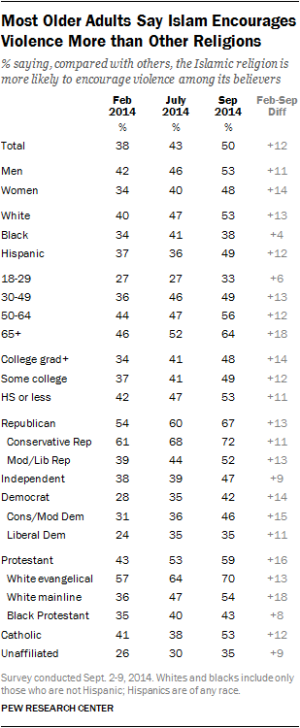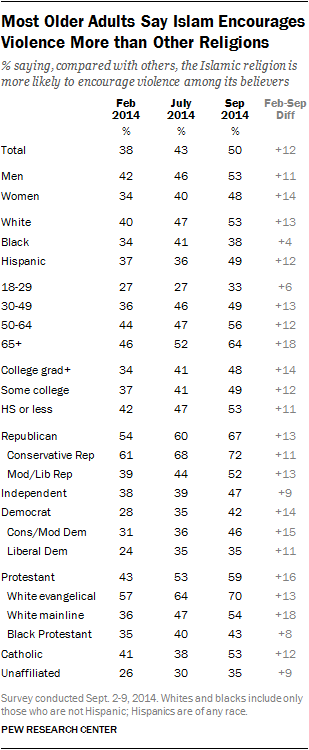As debate continues over President Obama's assertion about the religious nature (or lack thereof) of the Islamic State (ISIS) terrorist group, a new Pew Research Center study finds that more Americans across the board believe that Islam encourages violence more than other religions.
Obama announced on Wednesday that the United States would begin training forces near Iraq and Syria to combat the well-organized Sunni extremists. In the same speech, the president argued that despite its name, “ISIL is not Islamic.” “No religion condones the killing of innocents, and the vast majority of ISIL’s victims have been Muslim,” he added.
[Note: CT refers to the group as ISIS, which refers to the Islamic State of Iraq and Syria. Because the fighters use Syria to more broadly refer to Lebanon, parts of Turkey, and Jordan, the Obama administration uses ISIL, with the last initial referring to the Levant.]
The statement was widely contested, from the Family Research Council to Sam Harris.
“ISIS does not represent the whole of Islam, or even the majority stream within Islam today. As the president said, ISIS victimizes Muslims as well as non-Muslims, and many Muslims are appalled by the group’s conduct," wrote First Things columnist Mark Movsesian. "But ISIS has definite roots in parts of the Islamic tradition. For example, its treatment of Christians has antecedents in Islamic history. ISIS did not invent the dhimma on its own.”

Pew's September survey found that 70 percent of white evangelical Protestants now believe “Islam encourages violence more than other religions.” While this number, one of the highest of any demographic group, has risen 13 percentage points since February, the beliefs of Christians from all backgrounds have shifted against Islam.
For instance, agreement among white mainline Christians has risen even more, from 36 percent in February to 54 percent in September (an increase of 18 percentage points). Agreement among Catholics has risen from 41 percent to 53 percent (12 percentage points), and among black Protestants from 35 percent to 43 percent.
The report also finds that a majority of Americans are “very concerned” with the spread of Islamic extremism at home and worldwide. Following Osama bin Laden’s death in 2011, a record low number of Americans (36 percent) were “very concerned” about Islamic extremism. Now the number has risen to 53 percent for domestic threats and 62 percent for international threats. (Prior to bin Laden's death, concern was 52% for domestic threats and 49 percent for international threats.)
ISIS's violent actions have been condemned by many Muslim leaders, including Egypt's Al-Azhar, a top center of Sunni learning. The Organization of Islamic Cooperation argued that although ISIS claimed “that they do their acts in the name of Islam … their doing has nothing to do with Islam.” President Susilo Bambang Yudhoyono of Indonesia, the most populous Muslim country in the world, said in August that his country would “not tolerate it” and “forbid ISIS in Indonesia.”
In CT’s interview with Rodney Stark earlier this year on why global religious hostility is on the rise, the Baylor University sociologist suggested that Muslim violence was largely because "most Middle Eastern nations have several Muslim groups that have been bitter enemies for centuries."
“Some 75 percent of the people who died from religious hostility in 2012 were Muslims killed by Muslims. Then the terrible bitterness among them gets fanned by the enormous anger in these countries toward the West: the jealousy arising from poverty; technological backwardness; and then, of course, being appalled at the West's immorality, especially as depicted in the media,” said Stark. He also argued that “religious violence isn't something new in the world,” and noted that he hesitated “to think there is anything peculiar to the Islamic tradition. There is a problem, to be sure, in that Muhammad butchered people for their irreligion. But the fact is, Christians have killed each other by the millions too.”
In 2008, CT interviewed Dalia Mogahed, co-author of Who Speaks For Islam? What a Billion Muslims Really Think, who argued that “if the Qur'an espouses violence, then we should have a greater percentage of Muslims involved in violence.“
“Terrorist sympathizers or the ‘cheering section’—the 7 percent who are politically radicalized—are no more religious than mainstream Muslims who abhor violence and say it is morally unjustified. Muslims are as likely as Americans to denounce attacks on civilians,” she said.
CT also noted a 2013 Pew poll which compared the views of American Muslims to Muslims worldwide on suicide bombers and other matters.
[Photo courtesy of theglobalpanorama – Flickr]










